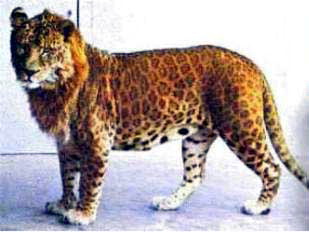|
| 질의: British museum | 결과: 145번째/154 | |
Leopon (Leopard-Lioness Hybrid) - Wiki
| 제목: | Leopon (Leopard-Lioness Hybrid) - Wiki
| |

| 해상도: 309x232
파일크기: 35455 Bytes
촬영일: 2007:09:15 16:57:42
등록시간: 2007:09:15 17:02:14
|
Leopon
From Wikipedia, the free encyclopedia
A leopon is the result of breeding a male leopard with a female lion lioness. The head of the animal is similar to that of a lion while the rest of the body carries similarities to leopards.
The first documented Leopon that bred at Kolhapur, India in 1915. Its skin was sent to R. I. Pocock by W. S. Millard, the Secretary of the Bombay Natural History Society. It was a cross between a large leopard and a lioness. Two cubs were born, one of which died aged 2.5 months and the other was still living when Pocock described it in 1912. Pocock wrote that it was spotted like a leopard, but that the spots on its sides were smaller and closer set than those of an Indian leopard and were brown and indistinct like the fading spots of a juvenile lion. The spots on the head, spine, belly and legs were black and distinct. The tail was spotted on the topside and striped underneath and had a blackish tip with longer hairs. The underside was dirty white, the ears were fawn and had a broad black bar but did not have the white spot found in leopards. Pocock wrote that the closest he had previously seen to this type of hybrid was the lijagulep (Congolese Spotted Lion) bred in Chicago.
They have been bred in zoos in Japan, Germany and Italy (the latter was a "reverse leopon" i.e. from a male lion and female leopardess). Karl Hagenbeck, who produced many different hybrids, recorded the birth of leopons at the Hamburg Tierpark in Germany, but none survived to maturity. A leopon skin and skull at the British Museum comes from the animal bred at Kolhapur Zoo in India and was donated by Lt. Col. F.W. Wodehouse of the Junior United Services sometime between 1920 and 1940.
The most successful leopon programme was at Koshien Hanshin Park in Nishinomiya City, Japan. A lioness called Sonoko was mated by a leopard called Kaneo. The lioness voluntarily assumed a position on her side to allow the much smaller leopard to mount her. A litter of 2 hybrids was born in 1959 and 3 more were born in 1962. In captivity, the normally solitary male leopard remained with the family (social behaviour is sometimes seen in captive specimens of normally solitary big cats). The hybrids proved to be sterile and the last one died in 1985. The programme of cross-breeding was popular with the public, but it was criticised in zoological and animal welfare circles.
Based on the data from the Japanese cats, leopons are larger than leopards and combine features from the leopard and lion. They have brown, rather than black, spots and tufted tails. They will climb like leopards and seem to enjoy water, also like the leopard (oddly enough, the Japanese leopons were born of a water-loving lioness and a male leopard that did not seem to like water!). Male leopons may have sparse manes about 20cm long . Females may be torn between the solitary nature of the leopard and the social nature of a lioness.
P L Florio published a report "Birth of a Lion x Leopard Hybrid in Italy" in 1983 (this refers to the "reverse leopon" also known as a lipard or liard).
http://en.wikipedia.org/wiki/Leopon
| The text in this page is based on the copyrighted Wikipedia article shown in above URL. It is used under the GNU Free Documentation License. You may redistribute it, verbatim or modified, providing that you comply with the terms of the GFDL. |
|
댓글 |
|---|
| | Alfreda Mcclinton |
|
| How is this possible?!?!?! I just don't get it.... I mean how could they produce a baby like this??? How long could it possibly live after birth??? |
^o^
동물그림창고 똑똑전화 누리집
^o^
|
|
|